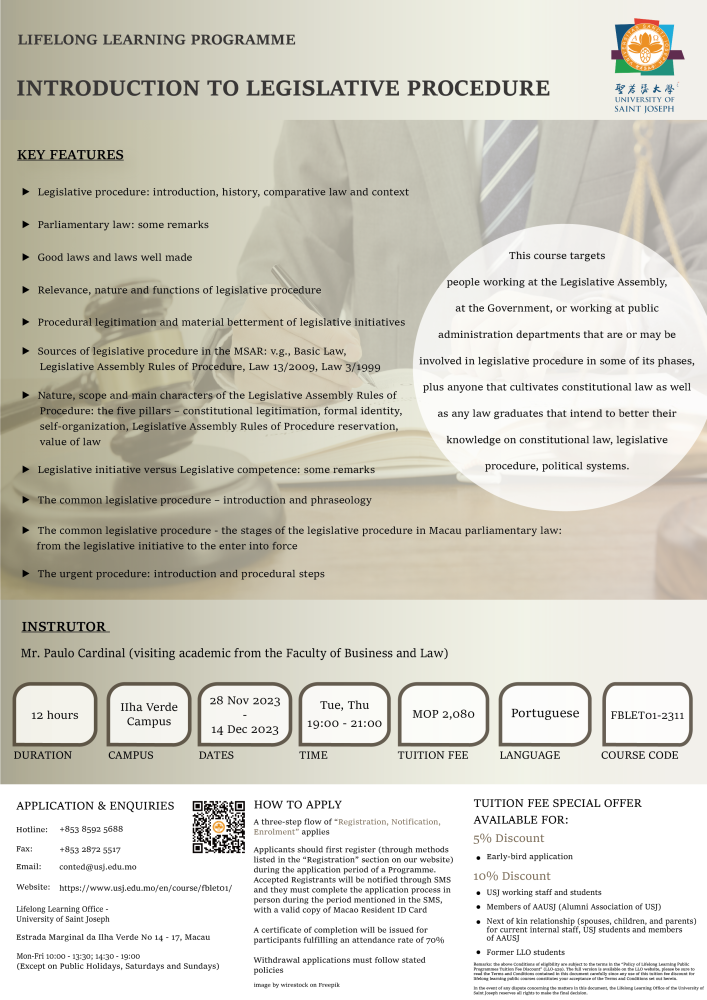Introduction to Legislative Procedure
立法程序基礎
Lifelong Learning
 O procedimento legislativo é matéria jurídico-constitucional de grande relevo prático e que suscita complexas questões teoréticas. Todavia, não tem recebido a atenção que merecia, sendo poucos os cursos e as obras a ele especificamente dedicados na RAEM.
O procedimento legislativo é matéria jurídico-constitucional de grande relevo prático e que suscita complexas questões teoréticas. Todavia, não tem recebido a atenção que merecia, sendo poucos os cursos e as obras a ele especificamente dedicados na RAEM.
Ir-se-á estudar o seguinte: Como surgem os actos legislativos? O que é o procedimento legislativo? Qual a sua importância, natureza e funções? O tecido normativo vigente na RAEM – Lei Básica, Regimento da Assembleia Legislativa, entre outros. A marcha do procedimento legislativo em Macau.
Key Features:
Portuguese version (show more details)
- Procedimento Legislativo: Introdução, história, jus-comparação e contexto
- O direito parlamentar – algumas notas
- Leis boas e leis bem feitas
- Importância, natureza e funções do procedimento legislativo
- A legitimação procedimental e a melhoria substantiva das iniciativas legislativas
- As fontes do procedimento legislativo na RAEM: v.g. Lei Básica, Regimento da Assembleia Legislativa, Lei n.º 13/2009, Lei n.º 3/1999
- Natureza, Âmbito, e Caracteres do Regimento da Assembleia Legislativa: os cinco pilares – legitimação constitucional, identidade formal, auto-organização, reserva de regimento, valor de lei.
- Iniciativa legislativa versus competência legislativa: algumas notas
- O processo legislativo comum – Introdução e Faseologia
- O processo legislativo comum – as etapas do procedimento legislativo no direito parlamentar de Macau: da iniciativa legislativa à entrada em vigor
- O processo de urgência – Introdução e procedimento
English version (show more details)
- Legislative procedure: introduction, history, comparative law and context
- Parliamentary law: some remarks
- Good laws and laws well made
- Relevance, nature and functions of legislative procedure
- Procedural legitimation and material betterment of legislative initiatives
- Sources of legislative procedure in the MSAR: v.g., Basic Law, Legislative Assembly Rules of Procedure, Law 13/2009, Law 3/1999
- Nature, scope and main characters of the Legislative Assembly Rules of Procedure: the five pillars – constitutional legitimation, formal identity, self-organization, Legislative Assembly Rules of Procedure reservation, value of law
- Legislative initiative versus Legislative competence: some remarks
- The common legislative procedure – introduction and phraseology
- The common legislative procedure – the stages of the legislative procedure in Macau parliamentary law: from the legislative initiative to the enter into force
- The urgent procedure: introduction and procedural steps
Details:
| Instructor: | Mr. Paulo Cardinal |
| Duration: | 12 Hours (6 Sessions) |
| Date: | 28 November to 14 December 2023 |
| Time: | Tue, Thu 19:00 – 21:00 |
| Location: | University of Saint Joseph – IIha Verde Campus |
| Language: | Portuguese |
| Delivery of Mode: | Face-to-face Lecture |
| Tuition Fee: | MOP2,080 |
| Targeted Participants: | People working at the Legislative Assembly, at the Government, or working at public administration departments that are or may be involved in legislative procedure in some of its phases, plus anyone that cultivates constitutional law as well as any law graduates that intend to better their knowledge on constitutional law, legislative procedure, political systems. |

┃5% Discount (MOP 1,976)
- Early-bird application
** Applicants who submit a complete course enrollment on or before 31 October 2023 will enjoy the early-bird special offer in this course. Registrants will be notified of enrollment details via E-mail and SMS after we receive the registration. Don’t miss it!
┃10% Discount (MOP 1,872)
- USJ working staff and students
- Members of AAUSJ (Alumni Association of USJ)
- Next of kin relationship (spouses, children, and parents), for current internal staff, USJ students, and members of AAUSJ
- Former LLO students
Notes: the D.S.E.D.J. 2023-2026 Continuing Education Development Subsidy Scheme is NOT available for this course.
Remarks: the above Conditions of eligibility are subject to the terms in the “Policy of Lifelong Learning Public Programmes Tuition Fee Discount” (LLO-529). The full version is available on the LLO website (click here), please be sure to read the Terms and Conditions contained in this document carefully since any use of this tuition fee discount for lifelong learning public courses constitutes your acceptance of the Terms and Conditions set out herein. In the event of any dispute concerning the matters in this document, the Lifelong Learning Office of the University of Saint Joseph reserves all rights to make the final decision.
Bibliografia principal:
PAULO CARDINAL, Lições de Procedimento legislativo no Direito Parlamentar de Macau, Macau, 2019
AAVV, Estudos no âmbito da Produção Legislativa, Textos em Língua Portuguesa, CFJJ, 2018
Bibliografia Complementar:
JOSÉ EDUARDO FIGUEIREDO DIAS, Procedimento legislativo, Colectânea, Tomo I, CFJJ
JORGE MIRANDA, Atos Legislativos, Almedina, 2019
PAULO CARDINAL/ZHENG WEI, A Questão das Infracções Administrativas no âmbito do Sistema das Fontes Normativas internas estatuído pela Lei Básica e desenvolvido pela Lei n.º 13/2009, in Administração, 98, 2012
ZHAO GUOQIANG, Uma Ponderação sobre Alguns Problemas da Reforma Jurídica, in Revista de Estudos de “Um País, Dois Sistemas” Vol. I
GUSTAVO GRAMAXO ROZEIRA, Procedimento Legislativo Parlamentar, Enciclopédia da Constituição Portuguesa, Jorge Bacelar Gouveia/Francisco Pereira Coutinho, Coordenadores, 2013
MANUEL ANDRADE NEVES/NUNO SARDINHA DA MATA/INÊS SEQUEIRA MENDES, Contributos para a legística de expressão portuguesa, CREDDM/Fundação Rui Cunha, 2015
HOW TO APPLY
A three-step flow of “Registration, Notification, Enrolment” applies.
Applicants should first register (through methods listed in the “Registration” section on our website) during the application period of a Programme. Accepted Registrants will be notified through SMS and they must complete the application process in person during the period mentioned in the SMS, with a valid copy of Macao Resident ID Card.
A certificate of completion will be issued for participants fulfilling an attendance rate of 70%.
Withdrawal applications must follow stated policies.
Remark: Programmes may be cancelled due to insufficient registration.










